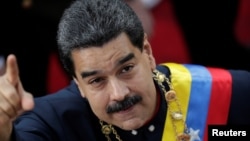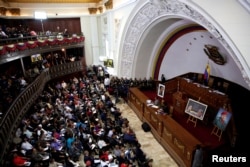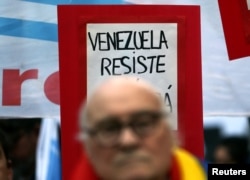Venezuela's pro-government constitutional assembly has given itself the power to pass laws, seizing legislative power from the opposition-led congress.
The assembly unanimously passed a decree Friday enabling it “to legislate on matters directly aimed at ensuring the preservation of peace, security, sovereignty, the socioeconomic financial system, the purposes of state and the preeminence of Venezuela's human rights.”
While the decree did not explicitly dissolve congress, it stripped away the already diminished powers of the body.
Also Friday, Venezuela's ousted chief prosecutor and her husband — two of President Nicolas Maduro's most outspoken critics — fled the country and landed in Colombia, authorities said.
Luisa Ortega Diaz and German Ferrer arrived in Bogota aboard a private plane traveling from Aruba, Colombian Migration authorities said.
No immediate details were provided on whether the couple was seeking asylum, with officials confirming only that Ortega had completed the "corresponding migration process."
Ortega and Ferrer have long been aligned with Venezuela's ruling Socialist Party but recently broke with Maduro, publicly denouncing his push to convene the constitutional assembly that was installed in early August.
'Here to bring order'
The president of the constituent assembly, Delcy Rodriguez, said, “We are not going to allow more distortions, more deviations aimed at attacking Venezuela's state of law. The constituent [assembly] is here to bring order.”
After the decree was passed, opposition lawmaker Omar Avila denounced the decision, stressing that the constituent assembly had not provided any solutions to the problems of everyday people.
“The constituent [assembly] is not meant to govern, it is not even meant to act as judges, acting and chasing those who think differently,” Avila said.
Venezuela's opposition-led congress already has little power in the country as the Socialist-dominated Supreme Court has stripped it of much of its functions and overruled most of the laws it approved since the opposition took control last year.
No oath of loyalty
Opposition leaders refused Friday to swear an oath of loyalty to the constituent assembly, which they have warned would crush dissent in the country.
The election of the assembly last month was boycotted by the opposition and triggered international condemnation. The body is charged with rewriting the country's 1999 constitution and has given permission to Maduro to rule by decree.
Maduro defends the all-powerful assembly as the country's only hope for peace and prosperity.
Elections set for October
As the assembly continues to increase its powers, both the opposition and ruling leadership work to organize gubernatorial elections set for October.
The National Election Council's president, Tibisay Lucena, announced that both the ruling and opposition parties have registered more than 200 candidates for the upcoming elections.
On the streets of Venezuela's capital, opinions varied on whether or not to participate in elections.
Freddy Sanchez said government officials “have lost the notion of where they are standing and the historical moment,” but he said elections are part of the constitution. “This is nothing new,” he said.
Ricardo Moros of Caracas said, “I would not like to participate for the simple reason that I feel betrayed; to participate would be to give the go-ahead to the government.”
Voters urged to take part
Political analyst Tony Tover told VOA that it in times of crisis, it is better to participate.
“We are in a dictatorship, we are not under a rule of law. Now, the elections of governors are constitutional, and therefore we democrats have the duty to participate,” Tover argued.
Months of nearly daily protests against Maduro have left more than 120 people dead and hundreds more injured or jailed.
The opposition has blamed Maduro's policies for an economic crisis in the country. The government has argued that the opposition is working with the United States to violently overthrow the president.






